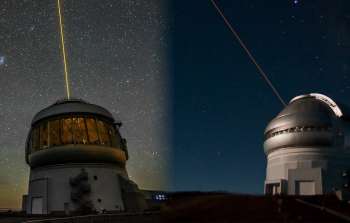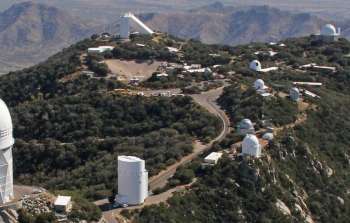sci20073 — Announcement
Status of NOIRLab Observing Time Lost to COVID-19
June 18, 2020
Gemini Observatory
Gemini South halted operations on 16 March 2020 and remains closed. Gemini North halted operations on 23 March and resumed limited nighttime operations on 19 May. All uncompleted (non-ToO) Band 1 programs for 2020A will rollover into the following semester, as usual for Band 1 programs. No special arrangements will be made for Band 2 and 3 programs, and these programs will come to an end when the 2020A semester closes. Target changes are not allowed, however if this would result in particular hardship (e.g., adverse effects on a student thesis), the NGO or PI should contact the Observatory and request an exception as soon as possible. Additional details are available here.
CTIO
CTIO has been closed since 18 March 2020. The observatory will rollover time on the Blanco 4m and SOAR telescopes awarded to survey and long-term proposals by the NOIRLab TAC and by the NASA TACs (HST, Chandra, Spitzer, and FERMI) for supporting ground based observations. Although observing time awarded to standard proposals will not be automatically rolled over, requests for DD time will receive a sympathetic ear especially when observations are time critical or form part of an investigator’s thesis research. Questions may be directed to CTIO Director Steve Heathcote (sheathcote@ctio.noao.edu).
KPNO
While KPNO has been closed since 18 March 2020, almost all of the open access time on Kitt Peak is NN-EXPLORE time on the WIYN 3.5m telescope, which has been devoted to NEID commissioning in the current schedule. An ongoing survey program on the WIYN 0.9m telescope will received prioritized scheduling when operations resume. Questions may be directed to KPNO Director Lori Allen (lallen@noao.edu).
AAT
ATT operations went through phases of shutdown (26 March – 10 May) and restricted operations (11 May – 1 June; programs using 2dF only), with all observations carried out remotely since 2 June 2020. All scheduled NOIRLab programs will proceed as requested, although observations will need to be carried out remotely. Observers with sufficient bandwidth and some previous observing experience will be allowed to observe from home. All NOIRLab observers will be supported by local AAT support astronomers, and observers will be provided with all instructions after completing the Visitor’s Form. Questions may be directed to Lucyna Chudczer (lucyna.chudczer@astronomyaustralia.org.au) or the Siding Spring Observatory Director, Chris Lidman (Christopher.Lidman@anu.edu.au).
CHARA
CHARA closed all on-sky operations on 19 March and resumed remote-only nighttime observing on 26 May. During this period, approximately 16.5 nights of NOIRLab community access time was lost. Weather data shows that more than half of the observing time lost to the shutdown would have been lost to weather (rain, snow, wind, humidity). Access to the observatory is currently very limited due to the ongoing pandemic. PIs with time remaining in the 2020A semester or in the upcoming 2020B semester are asked to contact Gail Schaefer (schaefer@chara-array.org) or Chris Farrington (farrington@chara-array.org) to discuss remote observing options as only CHARA staff are able to access the facility. Currently, CHARA is treating time lost to the closure as equivalent to a bad weather event. CHARA programs that lost time in 2020A should reapply in 2021A. Questions and concerns regarding lost time can be directed to the CHARA Director Douglas Gies (gies@chara.gsu.edu).
About the Announcement
| Id: |
ID
sci20073
|


